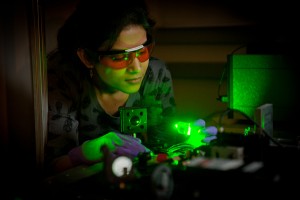Physics provides the conceptual skeleton built on by the other sciences and engineering. Energy, mass, momentum, forces, fields; these ideas form the basis of physical reality. The physicist is trained to see to the heart of a problem, to strip through layers of complexity to basic principles with insight and rigor. These skills can be as useful in a law office or a boardroom as in a laboratory.
More than most other majors, physics is a passport into a broad range of science, engineering, and education careers. Where you are likely to work will differ by your degree level. Only a few physics bachelors have the title, physicist. In large part, this is because most physics bachelors work in the private sector and, unlike other sciences, there is no “physics” industry; physics is used in nearly all industries. Among the most common occupations are engineer and computer scientist. Many physics bachelors also teach science in secondary schools. Over time, physics bachelors are often promoted into positions that involve managing projects, people, and budgets.
Courses include:
University Physics I, II & III, Instrumental & Data Analysis, Mechanics I & II, Thermal Physics, Electromagnetism I & II, Quantam Physics I & II, and Advanced Physics Laboratory
| College |
|
| Discipline | |
| Academic Department | |
| Departmental Contact | |
| Major Overview | |
| Plan Requirements | |
| Semester Sequence | |
| Minors | |
| Skills You Could Develop |
|
| Learn More About This Major | |
| Career Titles | |
| Learn More About Careers |
